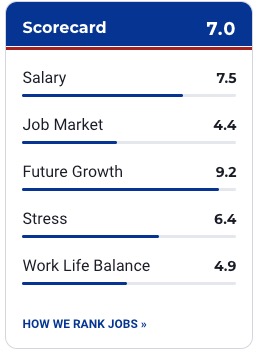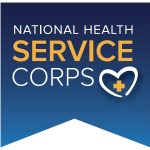
Have you seen the big news?
With a score of 7.0 out of 10, Physician Assistants/Associates sit at the top of the list as the number two healthcare job in America in 2024 and #5 of 100 top US jobs overall.
Who's number one? Hint: it's a close relative to the PA profession. Click the links above to find out!
Here are 10 Reasons why PAs are at the top of the list among American healthcare jobs in 2024 (and beyond)
1. There are a whole lot of PA jobs
It’s nice when you have paid the price of a mortgage for your professional degree and spent years of your life exchanging parties for organic chemistry books and Mountain Dew and coffee for tea and water to find a job waiting for you at the end of the proverbial tunnel. Right now, a graduate from PA school who is willing to open their arms to the many possibilities will find more than 12,000 open jobs waiting for them.
2. PA Salary is very good
The average wage for a certified physician assistant right now in the US is around $126,010. And if you choose your location wisely, this can translate into a decent quality of life. Nearly all PA jobs come with excellent medical benefits for you and your family, along with a retirement plan, vacation, education allowance, and yearly bonuses.
3. PAs get to work among a team of like-minded peers
I currently work part-time as a PA, splitting my days between online computer-based work (here and on my smartypance.com website) and clinical practice, where I see a panel of patients among fourteen peers in a shared office space. As easy as it is to mourn office politics, there is still something very charming about Christmas parties, shared laughter over office antics, and working with others to solve big problems.
As PAs, we get to be part of the team, among MAs, nurses, doctors, clinic managers, therapists, integrative health practitioners, social workers, etc., etc. all with the singular goal of making people's lives better. And it rocks! I won’t lie. Right now, I am writing this post at 7:30 am while still in my pajamas, and last night, I didn’t get home from the clinic till almost 10 pm, but it’s totally worth it.
4. Being a PA is considered high-stress, but then again, what good job isn’t?
If you are a PA, you will know what I’m talking about, and if you are on the path to PA, you will someday learn that the PA job isn't an easy one. The word charting raises my systolic blood pressure by ten points, and the barriers to providing adequate care can be overwhelming.
Fifteen-minute time slots filled with complex patients who need 40 minutes of attention combined with a constant barrage of phone calls, lab results, patient messages, staff messages, etc., etc. and I’m sure you will get the picture. But compared to my first job flipping Whoppers for ten hours a day, I will take the latter. This stress, although bad for my hairline, is the kind of pressure that makes a day fly by, and as my 8-year-old will tell you, “Makes your mind grow bigger.” Compare this to hard physical labor or monotonous line work, and I will take the stress of PA any day.
5. Unlike other top jobs (i.e., an attorney), when a PA goes to work, everyone wins
Although attorneys aren’t healthcare workers (unless they’re suing you), when an attorney goes to litigation, one person wins, and another loses. As a PA, when you go to work and everything runs as it should, everybody wins. This is a great feeling - working for the cause of improving the life of another person. I mean, does it get any better than this?
6. PAs have flexible hours and better work-life balance
When it comes to work-life balance (the number one reason why people choose PA school), it's all about priorities. I know plenty of PAs who put in long hours with little freedom and zero flexibility. I know others who work as locum tenens, travel the world, only take part-time assignments, work abroad, etc., etc. The point is that you do have options.
If you choose to accept a job in orthopedics that requires long hours and regular call with a boss who works you to the bone for their financial benefit, you do have the choice of keeping said job or looking elsewhere in search of a better work environment. Many PAs take jobs in the ER where they can work three 12-hour shifts and split time with their partners to share childcare and still make it to field trips and soccer games on the weekends. There is a demand for PAs 24/7, so you can be creative here. The pay is good enough that many PAs can work part-time and still raise a family or take extended time off for travel and come back to find a job waiting for them.
7. Compared to MD, PA schooling is a better deal
Maybe you have heard the news? MD schooling in the United States is crazy long, so long, in fact, that many are asking if doctors are too educated.
U.S. physicians average 14 years of higher education (four years of college, four years of medical school, and three to eight years to specialize in a residency or fellowship). That’s much longer than in other developed countries, where students typically study for 10 years.
If you go the traditional route and graduate college at, let’s say, twenty-one, take your MCAT and walk right into medical school, complete four years of medical training, graduate at 25, then go on to complete a 4–8-year residency if you’re lucky you can be working by age 30. Suppose you take a gap in between that gets pushed back even farther.
Compare this to my path as a PA. I graduated college at 21, spent two years in between working and traveling, attended PA school at 24, and graduated at 26, quickly accepting my first job. This opens the doors to older PA students, as well as “non-traditional” students, people changing careers, and students like myself who wouldn’t have had a medical school degree until my mid-30s.
8. PAs have a high degree of autonomy
Have you heard of the term MDM? It stands for medical decision-making. Everyone in healthcare makes medical decisions, from the front desk staff who triages a patient call all the way up the food chain to the medical director who implements hospital or clinic-wide protocols. But as PAs, we get to sit one-on-one with patients, hand in hand, making team decisions that directly impact their lives, are measurable, and produce results that we can often see in real-time. Most of the time, this is done alone, in conjunction with our patients, yes, with the oversight of a supervising physician, usually indirectly and always in the form of a supportive role. This autonomy, along with a high degree of uncertainty, makes the job extremely rewarding.
9. There are good programs to help pay off student loans
We all know the cost of PA school is going through the roof, and in a recent blog post, while crunching the numbers, I concluded that the current cost of PA education results in ends that don’t always justify the means. In other words, PA school may not be worth the cost based on the median PA job salary.
The good news is that there are plenty of PA school scholarships and grants available for those who seek them out, including The National Health Service Corps Scholarship and Loan Repayment Program, which I used to pay off 100% of my student loan debt before the age of thirty-five. But the NHSC is not for everyone. I spoke with a new graduate recently who was offered $250,000 in the Bay Area to work as a psychiatry PA, and that was before benefits. So, in this scenario, you may or may not benefit from loan repayment programs. But the fact that there are repayment programs available is golden, and it means even those like me who didn’t come from riches can work as PAs while eliminating student loan debt in a timely manner.
10. PAs may survive the AI revolution
Unlike radiologists, who are just one software upgrade away from extinction, PAs work alongside existing healthcare AI (electronic medical records) to provide hands-on care that improves patient outcomes and satisfaction.
As reported by the Oxford Martin School, around 50% of all U.S. jobs are at risk of being automated and replaced by robots. According to the Replaced by Robot website, PAs will almost certainly not be replaced by robots, and we are rated #190 out of #702 with only a 14% chance of automation.
Given the fact that human medical error is the third leading cause of death in the United States, AI and emerging technologies like IBM’s Watson will certainly improve patient outcomes while grossly expanding access to care and decreasing costs. The question is, how can PAs compete against an advanced AI capable of processing the entire world's medical literature every .002 seconds, one that learns from its mistakes and can tailor treatment plans based on thousands of independent patient variables?
Well, we can't, but it’s still going to be hard for Watson to perform a PAP smear, console a dying patient, calm a screaming toddler, and explain a cancer diagnosis or treatment plan to a terminal patient. While nurses can do many of these things, advanced-level practitioners such as PAs and NPs hold the perfect balance of medical and human IQ to thrive alongside emerging AI. In my opinion, even more than doctors.
What do you think?
So, do PAs deserve our high job ranking?
If I missed something on this list or you would like to weigh in on the latest US News healthcare jobs ranking report, let me know below in the comments section.
You can find the rest of the US News healthcare job ranking data, including who is number one, by clicking here.
Thanks, and have a jolly good day!
Stephen Pasquini PA-C
View all posts in this series
- Use this Interview Hack to Get The Physician Assistant Job of Your Dreams!
- The Physician Assistant Job or PA School Interview – Email Etiquette
- The Physician Assistant Interview: Thank You and Follow-up (With Sample)
- Your Main Goal on Your Path to PA Shouldn’t be Immediate Success or Money, But to Learn as Much as Possible
- Use VisualCV to Create a Stunning Physician Assistant Resume
- The 10 Best Websites for Physician Assistant Job Search in 2024
- The 10 Best Cities for PAs to Move to in 2024
- 10 Reasons Why Physician Assistant/Associate (PA) is the #2 Healthcare Job in 2024
- How to Write the Perfect Physician Assistant Cover Letter
- The 4 Most Common Reasons PAs Quit Their Jobs
















It’s fantastic to learn that physician assistants have flexible hours and a better work-life balance. My wife is wanting to find a job that will give her the freedom to live her life outside of work. I’ll let her know that getting a job as a physician assistant will give her that freedom.